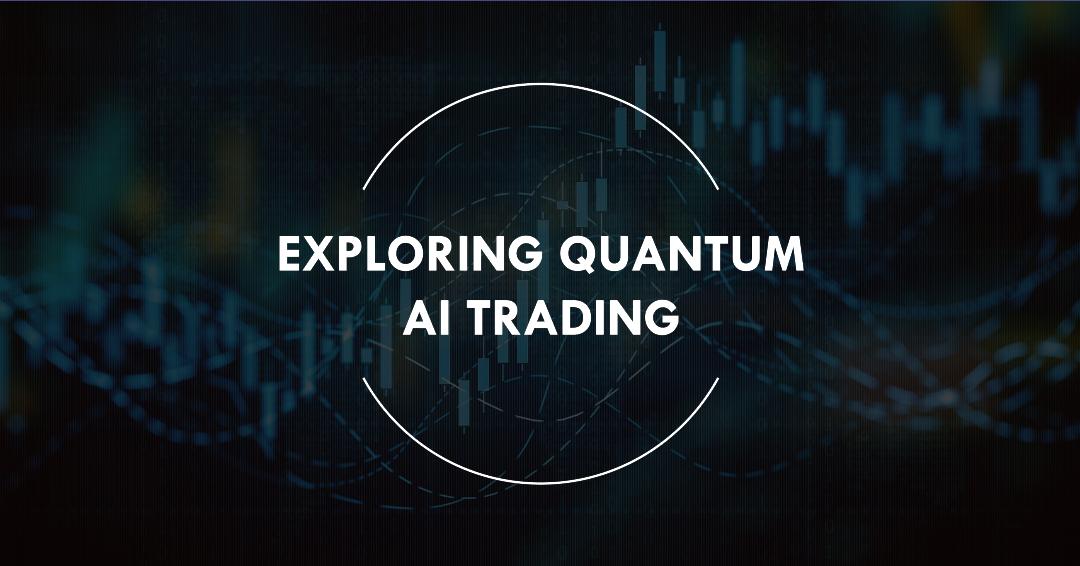The world of trading is on the cusp of a revolutionary transformation, one that promises to redefine every aspect of transactions and decision-making processes. Imagine harnessing the mysterious power of quantum mechanics combined with advanced artificial intelligence (AI) systems—this isn’t just science fiction anymore; welcome to ‘Quantum AI Trading.’ This cutting-edge technology integrates the surreal capabilities of quantum computing and insights from AI, rapidly reshaping the landscape for investors and traders alike.
The rise in popularity involves quantum AI trading being uniquely positioned at an intersection between two ground-breaking technologies. The speed advantages offered by quantum computing are well documented, as they promise to perform complex calculations at speeds light years ahead of traditional digital systems. Coupled with AI’s ability to analyze patterns and make predictive decisions with precision and accuracy far beyond human capability, it holds immense potential in financial transactions where time is money.
Soon, a wave unlike any we have seen before is poised to hit our shores. So come along on this voyage as we delve further into unlocking the mysteries behind Quantum AI Trading—a transformative technological marvel that appears poised not only to rewrite the rules but also to redraw how profits are pursued within investment circles.
Comprehending the Power of Quantum Computing’s Power
Stepping into the realm of quantum computing feels akin to entering an entirely novel universe. Unlike its classical counterpart, which utilizes binary digits or bits (1s and 0s) as their fundamental units of data, a quantum computer operates on an atomic level involving particles known as qubits. Instead of being limited to two states, like a bit, qubits can exist in multiple states at once due to a phenomenon called superposition. This allows quantum computers to process enormous quantities of information simultaneously—something beyond the reach of even today’s most powerful supercomputers.

Quantum computing’s primary departure from conventional computing lies in this remarkable property—superposition—coupled with another feature called entanglement. In layman’s terms, ‘entanglement’ describes that linked qubits can share information instantly irrespective of the physical distance separating them—a fresh spin on Albert Einstein’s spooky action at a distance. It entails that inefficiencies arising from data-transfer delays are non-existent in quantum systems—an advantage that is potentially groundbreaking for high-stake environments such as trading platforms.
It’s crucial not to perceive quantum computers merely as speedier versions of their classical counterparts; they leverage principles from the enigmatic realm of quantum mechanics, providing new avenues for problem-solving strategies unthinkable within traditional boolean logic confines. With such a monumental computational and informational capability upgrade brought forward by Quantum AI Trading, one might wonder how these developments translate specifically into enhancing trading performance—it sets up the stage compellingly for our exploration further ahead.
Embracing artificial intelligence in traditional trading landscapes
AI has been steadily disrupting traditional trading norms, serving as a key catalyst in propelling financial markets into an era of technologically oriented strategies. Conventional wisdom held that stock trading was an exclusive arena for savvy human minds, utilizing their inherent abilities to analyze complex economic indicators, chart trends, and execute trades at opportune moments. However, with AI stepping in, it translates these mental gymnastics into sophisticated algorithms capable of sourcing massive datasets faster than any investor or trader could manually handle. The ability here isn’t just about speed; AI leverages machine learning techniques infused with deep neural networks, which are designed to emulate human thinking patterns and predict valuable insights.

Nevertheless, while AI streamlines the process by automaking decision-making through programmed logic and trend analysis mechanics, its efficiency still faces headwinds when encountering complex market situations. In rapidly fluctuating markets or black swan events—rare scenarios that cannot be predicted based on past data—AI can falter due to its over-reliance on historical facts for generating future predictions. Without the capacity for intuitive reasoning that humans possess in uncertain circumstances, these systems may potentially misinterpret outliers as new trends that lead to erroneous decisions.
Moreover, one must not overlook ‘noise’ infiltrating algorithmic computations and bringing potential distortions within predictive models. Financial markets are organic entities resonating with countless factors. Global news developments, such as political upheavals or sudden international trade interferences, can rattle even robust machine learning models without appropriate filters built-in against unexpected market volatilities. Therefore, while AI shines extraordinarily in processing power capabilities within controlled environments and predictable conditions, comprehending anomalies remains a challenging terrain where humans tip scale via instinctual cognizance available beyond realms of factoid data crunching mechanisms possessed by machines today.
Harnessing the Power of Quantum AI’s Power: A New Trading Paradigm in Trading
The fusion of quantum computing and artificial intelligence for trading aims to revolutionize decision-making capabilities within the financial industry. At their core, both of these technologies are about processing information; however, when combined, they offer an incredibly potent tool that far surpasses traditional techniques.
Quantum computing leverages the principles of quantum mechanics to manipulate information in a fundamentally new way. Unlike classical computers that process bits as 0s or 1s, quantum computers use qubits, which can exist in multiple states at once—a phenomenon known as superposition. This allows them to handle complex computations and dig into vast amounts of data at astounding speed. When applied to trading systems, this translates into real-time analysis of market trends with unparalleled accuracy.
Artificial intelligence (AI), on its part, brings its capability to learn from past experiences automatically through machine learning algorithms. After sufficient training iterations, it’s able to predict future market movements reliably by leveraging historical data patterns. Imagine amalgamating this predictive capability with the high-speed processing potential of quantum computing. What we have is a robust system capable of providing instantaneous and precise investment recommendations even amidst volatile market conditions.
This strategic alliance between quantum computing and AI promises not just faster execution speeds but also unlocks numerous possibilities, such as optimized trading strategies based on immediate analysis and response mechanisms towards shifts in market dynamics, indeed ushering us into a promising era characterized by proficiency and swiftness like never before witnessed!
Amplifying Trading Success with Quantum AI: From Precise Analysis to Portfolio Optimization
Artificial intelligence combined with quantum computing can become an unprecedented tool for traders and investors, elevating the scale of precision in data processing. The ingenuity lies in Quantum AI’s ability to analyze multi-dimensional datasets at unparalleled speeds. This allows for more precise forecasting by decoding complex market patterns, trends, and signals that might not be visible or comprehensible under traditional quantitative models. Not only does this mean a holistic understanding of real-time scenarios, but it also signifies swift predictions about forthcoming market trends.

A less-talked-about application that emanates as a byproduct of the sophistication brought into trading analysis is risk management. By leveraging the inherent quantum properties such as superposition (where quantum bits exist in multiple states simultaneously) and entanglement (strong correlations existing between particles irrespective of their distance), we can enjoy comprehensive real-time simulations. These allow investors to virtually lay out different investment strategies under diverse conditions before making actual deals, thereby equipping them with intuitive prophylactics against the financial drawbacks associated with high-risk decisions.
While most technologies aid asset allocation with fixed algorithms built upon trailing market statistics, what sets Quantum AI apart is its proficiency based on dynamic markets rather than static figures derived from past data alone. Through rapid computational progressions involving probability amplitudes rather than definitive outcomes, portfolios are better optimized; maneuvering each trade according to the shifting tides of global capital markets instantly becomes feasible for individual traders without any prior expert knowledge.
Addressing Challenges in Quantum AI Trading
Unveiling the potential of quantum artificial intelligence trading is not without its hurdles. One major challenge lies in ensuring the privacy and security of sensitive financial information. Quantum computing’s design structure, which facilitates speedy processing and complex calculations, poses a risk to secured data transmission by potentially exploiting traditional encryption methods. With this ground-breaking technology at our fingertips, malicious entities might gain illegal access to confidential financial information quicker than ever before. To overcome this need for reinforced cybersecurity measures, devise quantum-resistant algorithms that can withstand such a potent force.
Further complicating the successful implementation of quantum AI trading systems are the technical difficulties intrinsically linked to quantum computing itself. For instance, sustaining ‘quantum superposition’—a state where qubits (the basic unit of quantum information) exist in multiple states simultaneously enabling high-speed parallel computations—is a daunting task due to an effect called ‘decoherence’. This refers to how interactions with external environments can cause the delicate state of qubits within a system to decay rapidly—a significant hitch given our current inability to prevent or correct it effectively without additional error.
Additionally, setting up practical implementations and providing sufficient cooling for these hyper-sensitive devices is another tech hurdle slowing down adoption rates in daily operations. In fact, even everyday vibrations or changes in temperature could disrupt computational processes—they must operate at temperatures colder than outer space!
Disruptive Potential of Quantum AI Trading’s Disruptive Potential in Financial Markets
The advent of quantum artificial intelligence (AI) trading brings forth a groundbreaking shift for traditional methods utilized within the finance sector. To evaluate its effects, it is crucial to understand that standard financial protocol often involves analytical processes carried out via classic computing methods. These practices analyze and forecast market trends based on past data, which can, unfortunately, miss fleeting opportunities due to their time-consuming nature.
Quantum AI trading, quite paradoxically, emerges as a disruptive force, revolutionizing these very methodologies. With the ability to factor in exponentially more variables at incomparable speeds owing to quantum computing’s principles, such as superposition and entanglement, this technology enables highly efficient real-time decision-making mechanisms. It opens up spaces where instantaneous arbitrage becomes possible, asserting a significant advantage over conventional techniques underlined by slow-paced trend analyses.
Equally important is the possibility of transforming markets through this cutting-edge amalgamation of high-speed processing power and machine learning algorithms adept at discerning complex patterns hidden within vast data sets with high precision accuracy. The concept creates an environment for radically optimized high-frequency trading strategies that are currently unattainable with today’s most advanced systems.
This transformative potential stands firm on pillars of predictive accuracy and superior risk management capabilities offered by quantum AI trading platforms—factors integral to securing an edge in competitive global markets that run incessantly around the clock across continents.
As a consequence, firms adopting or developing this technological prowess pave the way towards disrupting established resource-intensive models while opening new avenues for unprecedented growth landscapes within world financial markets.
Leveraging Quantum AI Trading’s Future Potential
As we venture further into uncharted financial waters, it is clear that quantum artificial intelligence (AI) trading embodies an innovative approach that could reshape our perception and operation of global markets. With the potential of this cutting-edge merger between quantum computing and AI, we can already glimpse a radical transformation in how trading decisions will be conceived.
As mentioned throughout this article, advanced predictive capabilities lie at the core of quantum AI trading’s prospective value. It provides the ability to rapidly process vast datasets drawing from diverse economic parameters globally—something unthinkable within human capacities or even traditional computational algorithms. This swift data assimilation generates granular market insights and anticipates fluctuating patterns with exceptional precision, allowing time-sensitive investment decisions while reducing the associated risks.
Moreover, coupling quantum mechanics’ principles with machine learning enables cognitive decision-making protocols emulating human intuition but expunged from emotional biases and inconsistencies. Thus, it not only infuses quantifiable confidence in financial decision-making processes but also holds promise for embedding a level playing field among traders through uniform access to instantaneous, high-quality analysis.
Through exploring these new-age concepts embedded in quantum AI trading, there are pertinent takeaways worth reflecting upon as we move closer to its implementation on widespread implementation. Firstly, embracing this technology means mounting unprecedented efficiency levels intertwined with remarkable accuracy gains across intricate financial operations. Secondly, despite unique challenges around its security or infrastructural prerequisites, it presents significant opportunities, beckoning early adopters who dare look beyond conventional predictions for smarter solutions yielding higher dividends.
Conclusion
In conclusion, AI trading is revolutionizing the way financial markets operate. With its ability to process massive amounts of data in real time and make informed decisions based on complex algorithms, AI has the potential to greatly enhance trading strategies and increase profitability. However, it is important to recognize that AI trading is not a foolproof solution and still requires human oversight and intervention.
As technology continues to advance, AI trading will likely become even more sophisticated and widespread. Therefore, investors should stay informed about developments in AI trading technology and consider incorporating it into their investment strategies for potential benefits.
Learn more about Quantum Ai trading here.


What a fantastic resource! The articles are meticulously crafted, offering a perfect balance of depth and accessibility. I always walk away having gained new understanding. My sincere appreciation to the team behind this outstanding website.